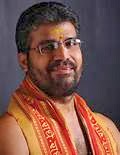Spiritual Import of Religious Festivals : 10-1.
Swami Krishnananda on pilgrimage to South India
Chapter 10: The Esoteric Significance of the Devi Mahatmya -1.
( A talk given on the 13th of October, 1972, during the Navaratri worship.)
By Swami Krishnananda
Our longings are fundamentally very deep and cannot be easily satisfied by temporary makeshift or a day-to-day adjustment of outer circumstances.
Our desires are profound; our yearnings are very unintelligible to the outer atmosphere of our daily life.
We seem to have a root which is deeper than what can be comprehended by our normal understanding of the world.
We grow from all sides, and when we long for, or desire, or yearn, or aspire, we do so in a very comprehensive manner.
This aspiration of the human being is really the soul's longing for freedom.
All our desires are desires of the soul, ultimately.
Though they look like sensory desires, mental desires, intellectual desires, social desires, etc., they are, at the bottom, the longing of the soul of the human being, which ramifies itself into various distracted rays through the operations of the mind and the activities of the senses.
Our longings are, therefore, capable of being collected into a single essential power, an inward urge, which we may call the longing for freedom.
It is freedom that we ask for and it is freedom that anyone asks for.
Varieties of longings and multitudes of enterprises in the world can be collected into a single focus of the soul's aspiration for liberation.
And this aspiration for liberation is not merely the longing of the human being, but of all that is created anywhere on earth or in heaven.
Whether it is the plant or the animal, whether it is a man or a celestial, the aspiration is this much.
All longings can be boiled down into the quintessence of the longing for liberation, freedom from all sides and an ultimate supremacy over one's own self in the realisation of this freedom.
The Devi-Mahatmya which, in a majestic poetry in Sanskrit, describes to us the epic of the march of the human soul to its destination – the realisation of this freedom – is the dramatic aspect of the great worship of the Divine Mother during these nine days of Navaratri, or Dassehra as we call it.
The march of the soul is dramatic. It is not a lagging or a crawling but a beautiful, sonorous, musical advent, we may say.
This is the beauty of the Devi-Mahatmya.
All epics have this particular character of grandeur, uplifting the emotions, and chastening the intellect of the devotee who goes through them.
Swami Krishnananda
To be continued ...
Chapter 10: The Esoteric Significance of the Devi Mahatmya -1.
( A talk given on the 13th of October, 1972, during the Navaratri worship.)
By Swami Krishnananda
Our longings are fundamentally very deep and cannot be easily satisfied by temporary makeshift or a day-to-day adjustment of outer circumstances.
Our desires are profound; our yearnings are very unintelligible to the outer atmosphere of our daily life.
We seem to have a root which is deeper than what can be comprehended by our normal understanding of the world.
We grow from all sides, and when we long for, or desire, or yearn, or aspire, we do so in a very comprehensive manner.
This aspiration of the human being is really the soul's longing for freedom.
All our desires are desires of the soul, ultimately.
Though they look like sensory desires, mental desires, intellectual desires, social desires, etc., they are, at the bottom, the longing of the soul of the human being, which ramifies itself into various distracted rays through the operations of the mind and the activities of the senses.
Our longings are, therefore, capable of being collected into a single essential power, an inward urge, which we may call the longing for freedom.
It is freedom that we ask for and it is freedom that anyone asks for.
Varieties of longings and multitudes of enterprises in the world can be collected into a single focus of the soul's aspiration for liberation.
And this aspiration for liberation is not merely the longing of the human being, but of all that is created anywhere on earth or in heaven.
Whether it is the plant or the animal, whether it is a man or a celestial, the aspiration is this much.
All longings can be boiled down into the quintessence of the longing for liberation, freedom from all sides and an ultimate supremacy over one's own self in the realisation of this freedom.
The Devi-Mahatmya which, in a majestic poetry in Sanskrit, describes to us the epic of the march of the human soul to its destination – the realisation of this freedom – is the dramatic aspect of the great worship of the Divine Mother during these nine days of Navaratri, or Dassehra as we call it.
The march of the soul is dramatic. It is not a lagging or a crawling but a beautiful, sonorous, musical advent, we may say.
This is the beauty of the Devi-Mahatmya.
All epics have this particular character of grandeur, uplifting the emotions, and chastening the intellect of the devotee who goes through them.
Swami Krishnananda
To be continued ...





Comments